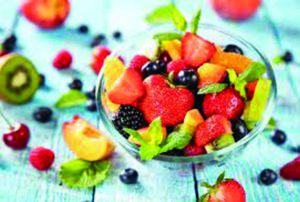 Parents are often told fruit is “bad” because it contains sugar, prompting concerns about how much fruit they should allow their child to eat.
Parents are often told fruit is “bad” because it contains sugar, prompting concerns about how much fruit they should allow their child to eat.
This message has been fuelled by the “sugar-free” movement, which demonises sugar with claims it’s fattening and causes diabetes.
The movement promotes arbitrary lists of foods to avoid, which often include kids’ favourites such as bananas and berries.
But like many claims made by the diet industry, this one isn’t backed by evidence.
Naturally occurring
versus added sugars
Sugar itself isn’t inherently harmful, but the type of sugar kids eat can be.
The good news is whole fruits contain naturally occurring sugars that are healthy and provide kids with energy. Whole fruits are packed with vitamins and minerals needed for good health.
This includes vitamins A, C, E, magnesium, zinc and folic acid. All fruits are suitable – bananas, berries, mandarins, apples and mangoes, to name just a few.
The insoluble fibre in fruit skins also helps kids stay regular, and the soluble fibre in fruit flesh helps keep their cholesterol in a healthy range, absorbing “bad” cholesterol to reduce their long-term risk of stroke and heart disease.
Added sugars, which add calories but no nutritional value to kids’ diets are the “bad” sugars and the ones to avoid.
They’re found in processed and ultra-processed foods kids crave, such as lollies, chocolates, cakes and soft drinks.
Added sugars are often added to seemingly healthy packaged foods, such as muesli bars.
They’re also hidden under 60-plus different names in ingredient lists, making them hard to spot.
Sugar, weight and
diabetes risk
There’s no evidence backing claims that sugar directly causes diabetes. Type 1 diabetes is an autoimmune disease that can’t be prevented or cured and has no connection to sugar consumption.
Type 2 diabetes is typically caused when we carry excess body weight, which stops the body from working efficiently, not sugar intake.
However, a diet high in added sugars – found in many processed, ultra-processed foods (for example, sweet and savoury packaged snacks) – can mean kids consume excess calories and gain unnecessary weight, which may increase their chance of developing type 2 diabetes as they get older.
On the other hand, research shows that kids who eat more fruit have less abdominal fat.
Research also shows fruit can reduce the risk of type 2 diabetes, with one study finding kids who ate 1.5 servings of fruit daily had a 36% lower risk of developing the disease.
Nutritional deficiencies
A diet high in added sugars can also result in nutritional deficiencies. Many processed foods offer low-to-no nutrition, which is why dietary guidelines recommend limiting them.
Kids filling up on these foods are less likely to eat vegetables, fruits, whole grains and lean meats, producing a diet lacking in fibre and other key nutrients needed for growth and development.
But these “discretionary foods” make up one-third of Aussie kids’ daily energy intake. My advice? Give kids fruit in abundance
There’s no need to limit how much whole fruit kids eat – it’s nutritious, filling and can protect their health.
It’s also going to fill them up and reduce their desire to scream out for the processed, packet food that is low in nutrition, and calorie-rich.
Just go easy on juiced and dried fruits because juicing leaves the goodness (the fibre) behind in the juicer, and drying strips fruits of their water content, making them easy to overconsume.
The nutritional guidelines recommend just two serves of fruit a day for those nine years of age and older, 1.5 serves from 4-8, one serve from 2-3, and half a serve from 1-2 years. But these guidelines are dated and need to be changed.
We do need to reduce kids’ sugar consumption. But this needs to be achieved by reducing their intake of processed foods that contain added sugars, rather than fruit.
Added sugars aren’t always easy to spot, so we should focus on reducing kids’ consumption of processed and packet foods and teaching them to rely on fruit – “nature’s treats” – as a way to keep unhealthy sugars out of their diets. (The Conversation)



